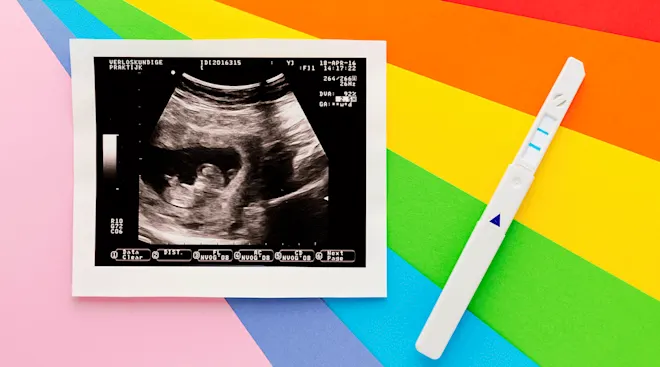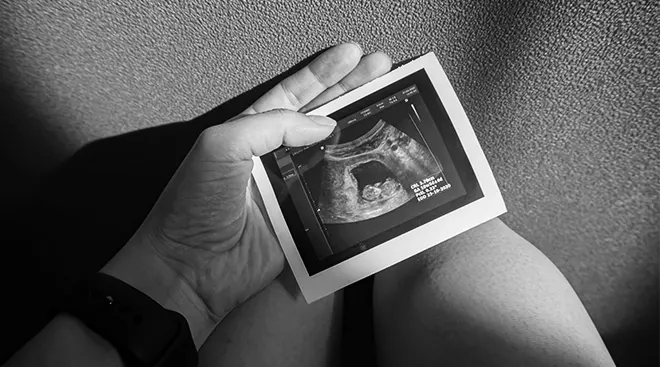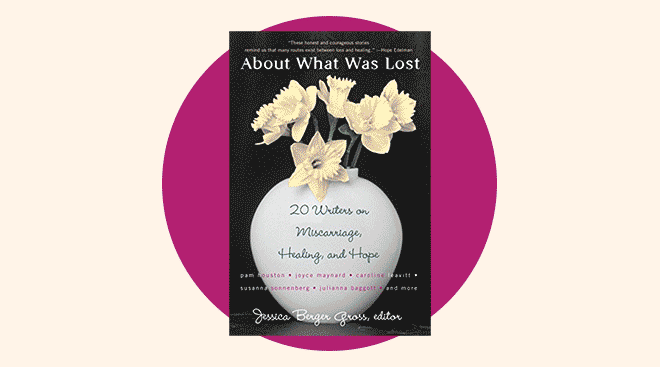What Is a Chemical Pregnancy? Everything You Need to Know
It’s a common enough scenario: You’re trying to get pregnant and think your period is late, only to experience a heavy flow a few days later. You may not realize it, but you might have just had what’s known as a chemical pregnancy, which is a very early miscarriage. Chemical pregnancy is actually quite prevalent and often goes unnoticed. But with the rise of early-detection pregnancy tests also comes the rise of awareness of early loss—and having to grapple with it.
A chemical pregnancy—also known as a biochemical pregnancy—is a very early miscarriage that happens when a fertilized egg fails to properly implant in the uterus, usually before the fifth week of pregnancy. “If, on average, about 20 percent of pregnancies end in miscarriage, up to 75 percent of those miscarriages are chemical pregnancies,” says Sherry Ross, MD, a Santa Monica, California-based ob-gyn and author of She-ology: The Definitive Guide to Women’s Intimate Health. Period.
“Most women who experience a chemical pregnancy never even knew they were pregnant,” Ross says. That’s because with the bleeding that usually accompanies it, a chemical pregnancy can just seem like a late, heavy period.
But if you’re trying to conceive and regularly taking pregnancy tests, a chemical pregnancy can throw you for an emotional loop. Since an embryo starts producing human chorionic gonadotropin (hCG), the hormone that pregnancy tests are designed to scan for, as soon as it initially implants in the uterus, an early home pregnancy test or blood test could display a positive result—only for the telltale heavy bleeding of chemical pregnancy to appear a week or so later.
A chemical pregnancy is not the same as a false positive on a pregnancy test. In the case of a chemical pregnancy, a positive result is an accurate reading—there really is a baby on board. Unfortunately, if the pregnancy isn’t viable, you may start bleeding soon after. In truth, had you not taken a pregnancy test, you may have never even realized you were pregnant. A false positive, on the other hand, is rare and typically the result of user error.
So do you need to do anything after experiencing a chemical pregnancy? The good news is that a chemical pregnancy doesn’t require medical intervention, and you should be able to try to conceive again during your next cycle. Remember, you might not even realize you’ve experienced a chemical pregnancy.
Chemical pregnancy vs. clinical miscarriage
Because it happens so early on (around week 4 or 5), a chemical pregnancy refers to the loss of a pregnancy before the gestational sac would be visible through ultrasound. A clinical miscarriage, however, happens after an ultrasound shows visible confirmation of a pregnancy. Similarly, during a chemical pregnancy, a blood test may not even detect hCG (or it may indicate very low levels of the hormone). In a clinical pregnancy, hCG is detected; if miscarriage occurs, hCG levels will typically begin to decline.
According to the American Congress of Obstetricians and Gynecologists (ACOG), about half of all early pregnancy loss is due to a random event where there’s an issue with the embryo’s chromosome count. Quick biology lesson: Chromosomes are the structures inside cells that carry genes. Normal cells have 46 chromosomes—23 that come from sperm and 23 that come from the egg. But if an egg or sperm has too many or too few chromosomes, the embryo will wind up with a chromosomal abnormality and will fail to develop normally, sometimes ending in a chemical pregnancy.
Other possible chemical pregnancy causes include:
• An infection, such as syphilis or chlamydia
• Abnormal hormone levels
• Thin or inadequate lining of the uterus
• Implantation outside of the uterus
Chemical pregnancy risk factors
The risk of chemical pregnancy increases if you’re over the age of 35 or dealing with certain medical issues, such as blood clotting and thyroid disorders. Unfortunately, there are no known ways to prevent chemical pregnancy.
What are the signs of chemical pregnancy? The truth is, this type of miscarriage happens so early on, you may not notice any chemical pregnancy symptoms at all. “Many women won’t be aware they’ve experienced a chemical pregnancy loss unless they’ve taken a home pregnancy test,” says Mark P. Trolice, MD, director of Fertility CARE: The IVF Center in Orlando, Florida, and author of From Infertility to Parenthood. The unfortunate reality is that you may see a faint positive reading on an early home pregnancy test, only to receive a negative result a week or two later.
Couples going through IVF and other fertility treatments—as well as those who are diligently trying to conceive—may be more likely to recognize a chemical pregnancy since they’re actively taking early pregnancy tests.
Another potential sign of a chemical pregnancy is a blood test that reveals low hCG levels. Despite an initial spike in the hormone right around the time you’d get a positive pregnancy result, the levels may rapidly decline during a chemical pregnancy.
More times than not, though, chemical pregnancy symptoms are just like those of a menstrual cycle. The timing of this type of bleeding typically aligns with—or slightly after—an expected period, so this can be extra confusing; it’s also why it can go completely undetected. Other chemical pregnancy symptoms can include period-like uterine cramps in the days after a pregnancy test and passing clots of blood from the vagina.
Chemical pregnancy vs. implantation bleeding
Keep in mind, bleeding isn’t always a bad sign: In fact, light spotting can be a sign of successful implantation. “In the first trimester, 15 to 25 percent of pregnancies can experience vaginal bleeding,” Trolice says. “And while any bleeding may at first be alarming, unless the bleeding is heavy, it’s not associated with miscarriage.” Implantation bleeding, as it’s called, usually happens one to two weeks after ovulation and is “a completely normal sign of a healthy pregnancy,” Ross says.
Still, if you have any chemical pregnancy symptoms after a positive pregnancy test—even if it’s light spotting—call your doctor.
While chemical pregnancy may go unnoticed for some, an early miscarriage can take an emotional toll on those who are aware of the loss, especially if they had been trying to conceive for a while. “A chemical pregnancy can be as devastating as a clinical miscarriage, so the woman needs appropriate support from her partner and loved ones,” Trolice says.
Feelings of sadness, anxiety and guilt are common after experiencing a chemical pregnancy, says Aparna Iyer, MD, a reproductive psychiatrist in Frisco, Texas. “Many encounter emotional fears that they may have somehow caused the loss, even when they recognize intellectually that this isn’t true,” she says. It’s important to remember that there’s nothing you can do to prevent a chemical pregnancy. In most cases a chromosomal abnormality is at fault, and the outcome is completely out of your hands.
Still, Iyer acknowledges that some of her patients have been surprised at how strongly they reacted, since the pregnancy didn’t last long. “However, a loss is a loss,” Iyer says, “and losing a pregnancy is a significant loss for many.” How someone wants to open up about a chemical pregnancy is up to them, but “struggling alone is rarely the healthiest option,” Iyer says.
It’s understandable to feel hesitant about getting pregnant after chemical pregnancy, but it’s healthy to “acknowledge and confront those fears. An important way to work through the fears is to speak candidly with your physician,” Iyer says. “Having a medical view of what to expect can help set your expectations and help you work through anxiety.”
If you do experience a chemical pregnancy, the good news is that it’s absolutely possible to become pregnant afterward. “Actually, a chemical pregnancy is somewhat encouraging, because it shows that the woman’s partner’s sperm can fertilize her egg, and her uterus can call for embryo implantation,” Trolice says. “Fortunately, the prognosis is good for an ultimately successful pregnancy and baby.”
In fact, a woman may ovulate and get pregnant as soon as two weeks after experiencing a chemical pregnancy. “Since a chemical pregnancy is an early miscarriage, your chances of a healthy pregnancy are likely after having one miscarriage,” Ross says. “A person’s risk of miscarriage ranges from 10 to 50 percent, depending on age, with the average risk being around 15 percent. Only 2 percent will experience two miscarriages in a row.”
There’s no medical reason to delay trying to conceive after a chemical pregnancy. “Once hCG levels decline and you have a subsequent period, she can resume trying to conceive,” Trolice says. In fact, you may be more fertile following a chemical pregnancy: A study found that those who tried to get pregnant within three months of a lost pregnancy were 17 percent more likely to conceive and have a live birth than those who waited longer. If you have experienced subsequent miscarriages or believe you have had multiple chemical pregnancies, talk to your doctor.
As you navigate this terrain, know that in some ways, taking an early pregnancy test can be considered a double-edged sword. Learning the exciting news before your missed period can be thrilling for eager parents-to-be. On the flip side, early confirmation also means you’re more likely to be able to diagnose bleeding associated with chemical pregnancy versus that of your regular period. In short, it can make you more vulnerable to the realization of pregnancy loss and the emotional aftermath.
A chemical pregnancy can feel like the ultimate deception; one moment you were happily expecting, and then—quite suddenly—you’re not anymore. It’s unfortunate and sad, but it’s also incredibly common; so if you experience this early loss, remember you’re not alone. You may want to try to get pregnant again right away, or you could need time to mentally process and emotionally heal. Either way, understanding what’s happening in your body and acknowledging that it’s not your fault can help you move forward. Remember, there’s a silver lining to this experience: You got pregnant once—it can happen again.
Please note: The Bump and the materials and information it contains are not intended to, and do not constitute, medical or other health advice or diagnosis and should not be used as such. You should always consult with a qualified physician or health professional about your specific circumstances.
Plus, more from The Bump
Sherry A. Ross, MD, is a women’s health expert and ob-gyn at Providence Saint John’s Health Center in Santa Monica, California. She is also the author of She-ology: The Definitive Guide to Women’s Intimate Health. Period and She-ology, the She-quel: Let’s Continue the Conversation. She received her medical degree from New York Medical College in Valhalla, New York.
Mark P. Trolice, MD, is the director of Fertility CARE: The IVF Center in Orlando, Florida, and author of From Infertility to Parenthood. He received his medical degree at Rutgers Robert Wood Johnson Medical School in New Brunswick, New Jersey.
Aparna Iyer, MD, is a reproductive psychiatrist in Frisco, Texas. She previously served as assistant professor and chief resident at Albany Medical Center in Albany, New York. Iyer received her medical degree at St. George's University in Grenada, West Indies.
American Congress of Obstetricians and Gynecologists (ACOG), Early Pregnancy Loss, May 2023
Learn how we ensure the accuracy of our content through our editorial and medical review process.
Navigate forward to interact with the calendar and select a date. Press the question mark key to get the keyboard shortcuts for changing dates.



















































